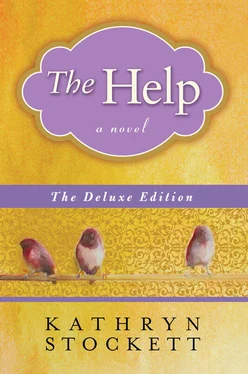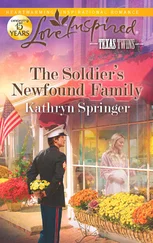At eight o’clock that same night, I’m stumbling down Aibileen’s street as discreetly as one can carrying a fifty-pound Corona typewriter. I knock softly, already dying for another cigarette to calm my nerves. Aibileen answers and I slip inside. She’s wearing the same green dress and stiff black shoes as last time.
I try to smile, like I’m confident it will work this time, despite the idea she explained over the phone. “Could we . . . sit in the kitchen this time?” I ask. “Would you mind?”
“Alright. Ain’t nothing to look at, but come on back.”
The kitchen is about half the size of the living room, and warmer. It smells like tea and lemons. The black-and-white linoleum floor has been scrubbed thin. There’s just enough counter for the china tea set.
I set the typewriter on a scratched red table under the window. Aibileen starts to pour the hot water into the teapot.
“Oh, none for me, thanks,” I say and reach in my bag. “I brought us some Co-Colas if you want one.” I’ve tried to come up with ways to make Aibileen more comfortable. Number One: don’t make her feel like she has to serve me.
“Well, ain’t that nice. I usually don’t take my tea till later anyway.” She brings over an opener and two glasses. I drink mine straight from the bottle and, seeing this, she pushes the glasses aside, does the same.
I called Aibileen after Elizabeth gave me the note, and listened hopefully as Aibileen told me her idea—for her to write her own words down and then show me what’s she’s written. I tried to act excited. But I know I’ll have to rewrite everything she’s written, wasting even more time. I thought it might make it easier if she could see it in typeface instead of me reading it and telling her it can’t work this way.
We smile at each other. I take a sip of my Coke, smooth my blouse. “So . . .” I say.
Aibileen has a wire-ringed notebook in front of her. “Want me to . . . just go head and read?”
“Sure,” I say.
We both take deep breaths and she begins reading in a slow, steady voice.
“My first white baby to ever look after was named Alton Carrington Speers. It was 1924 and I’d just turned fifteen years old. Alton was a long, skinny baby with hair fine as silk on a corn . . .”
I begin typing as she reads, her words rhythmic, pronounced more clearly than her usual talk. “Every window in that filthy house was painted shut on the inside, even though the house was big with a wide green lawn. I knew the air was bad, felt sick myself . . .”
“Hang on,” I say. I’ve typed wide greem. I blow on the typing fluid, retype it. “Okay, go ahead.”
“When the mama died, six months later,” she reads, “of the lung disease, they kept me on to raise Alton until they moved away to Memphis. I loved that baby and he loved me and that’s when I knew I was good at making children feel proud of themselves . . .”
I hadn’t wanted to insult Aibileen when she told me her idea. I tried to urge her out of it, over the phone. “Writing isn’t that easy. And you wouldn’t have time for this anyway, Aibileen, not with a full-time job.”
“Can’t be much different than writing my prayers every night.”
It was the first interesting thing she’d told me about herself since we’d started the project, so I’d grabbed the shopping pad in the pantry. “You don’t say your prayers, then?”
“I never told nobody that before. Not even Minny. Find I can get my point across a lot better writing em down.”
“So this is what you do on the weekends?” I asked. “In your spare time?” I liked the idea of capturing her life outside of work, when she wasn’t under the eye of Elizabeth Leefolt.
“Oh no, I write a hour, sometimes two ever day. Lot a ailing, sick peoples in this town.”
I was impressed. That was more than I wrote on some days. I told her we’d try it just to get the project going again.
Aibileen takes a breath, a swallow of Coke, and reads on.
She backtracks to her first job at thirteen, cleaning the Francis the First silver service at the governor’s mansion. She reads how on her first morning, she made a mistake on the chart where you filled in the number of pieces so they’d know you hadn’t stolen anything.
“I come home that morning, after I been fired, and stood outside my house with my new work shoes on. The shoes my mama paid a month’s worth a light bill for. I guess that’s when I understood what shame was and the color of it too. Shame ain’t black, like dirt, like I always thought it was. Shame be the color of a new white uniform your mother ironed all night to pay for, white without a smudge or a speck a work-dirt on it.”
Aibileen looks up to see what I think. I stop typing. I’d expected the stories to be sweet, glossy. I realize I might be getting more than I’d bargained for. She reads on.
“. . . so I go on and get the chiffarobe straightened out and before I know it, that little white boy done cut his fingers clean off in that window fan I asked her to take out ten times. I never seen that much red come out a person and I grab the boy, I grab them four fingers. Tote him to the colored hospital cause I didn’t know where the white one was. But when I got there, a colored man stop me and say, Is this boy white? ” The typewriter keys are clacking like hail on a roof. Aibileen is reading faster and I am ignoring my mistakes, stopping her only to put in another page. Every eight seconds, I fling the carriage aside.
“And I say, Yessuh, and he say, Is them his white fingers? And I say, Yessuh, and he say, Well, you better tell em he your high yellow cause that colored doctor won’t operate on a white boy in a Negro hospital. And then a white policeman grab me and he say, Now you look a here— ”
She stops. Looks up. The clacking ceases.
“What? The policeman said look a here what?”
“Well, that’s all I put down. Had to catch the bus for work this morning.”
I hit the return and the typewriter dings. Aibileen and I look each other straight in the eye. I think this might actually work.
EVERY OTHER NIGHT for the next two weeks, I tell Mother I’m off to feed the hungry at the Canton Presbyterian Church, where we, fortunately, know not a soul. Of course she’d rather I go down to the First Presbyterian, but Mother’s not one to argue with Christian works and she nods approvingly, tells me on the side to make sure I wash my hands thoroughly with soap afterward.
Hour after hour, in Aibileen’s kitchen, she reads her writing and I type, the details thickening, the babies’ faces sliding into focus. At first, I’m disappointed that Aibileen is doing most of the writing, with me just editing. But if Missus Stein likes it, I’ll be writing the other maids’ stories and that will be more than enough work. If she likes it . . . I find myself saying this over and over in my head, hoping it might make it so.
Aibileen’s writing is clear, honest. I tell her so.
“Well, look who I been writing to.” She chuckles. “Can’t lie to God.”
Before I was born, she actually picked cotton for a week at Longleaf, my own family’s farm. Once she lapses into talking about Constantine without my even asking.
“Law, that Constantine could sing. Like a purebred angel standing in the front a the church. Give everbody chills, listening to that silky voice a hers and when she wouldn’t sing no more after she had to give her baby to—” She stops. Looks at me.
She says, “Anyway.”
I tell myself not to press her. I wish I could hear everything she knows about Constantine, but I’ll wait until we’ve finished her interviews. I don’t want to put anything between us now.
Читать дальше












